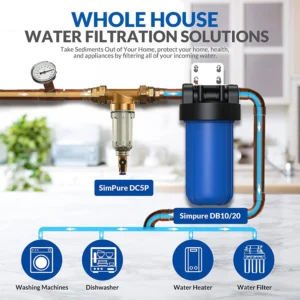Why a Well Water Filtration System is Essential
A well water filtration system is more than just a household upgrade—it’s a critical safeguard for your family’s health and the longevity of your plumbing and appliances. Unlike municipal water, which is rigorously treated and tested by public health agencies, private well water is the responsibility of the homeowner. It does not pass through city filtration plants, meaning it can contain a wide range of natural and man-made contaminants.
These contaminants might include:
-
Bacteria and viruses from nearby septic systems or animal waste
-
Iron, manganese, and sulfur from natural deposits, causing staining and odor
-
Pesticides and herbicides from agricultural runoff
-
Heavy metals like lead or arsenic
-
Hardness minerals like calcium and magnesium that can damage pipes and appliances
Without proper testing and a tailored filtration system, these substances can:
-
Make water unsafe to drink
-
Cause skin irritation
-
Damage plumbing systems
-
Stain fixtures and laundry
-
Make water taste or smell unpleasant
By installing a customized well water filtration system, you gain peace of mind knowing that your water is clean, safe, and free from harmful impurities—whether you’re cooking, drinking, bathing, or doing laundry.
How to Purify Well Water Near You
Purifying well water involves several steps:
-
Water Testing: Identify contaminants through professional testing services.
-
Selecting a Filtration System: Choose a system based on test results—options include sediment filters, activated carbon filters, and UV purifiers.
-
Installation: Hire certified professionals to install the system correctly.
-
Maintenance: Regularly replace filters and service the system to ensure optimal performance.
For residents in Ohio, services like Ohio Water Testing offer comprehensive water analysis and treatment solutions.

Is Well Water Safe to Drink?
Well water can be safe for consumption if properly tested and treated. However, risks include:
-
Bacterial Contamination: From septic systems or animal waste.
-
Chemical Pollution: Due to agricultural runoff or industrial activities.
-
Heavy Metals: Such as lead or arsenic from natural deposits.
The Cleveland Clinic emphasizes the importance of annual testing and proper maintenance to ensure well water safety.
Well Water Testing in Ohio: A Must for Every Private Well Owner
Ohio is home to diverse geological formations and agricultural regions, both of which can affect well water quality. Depending on your location, your water may contain high levels of iron, bacteria, nitrates, hardness, or even methane gas. This makes regular well water testing in Ohio essential to ensure your household water remains safe and up to recommended standards.
FAQs: Well Water Filtration and Testing
-
Why is a well water filtration system important?
It removes contaminants not treated by public systems, making your water safe and clean. -
How do I know if my well water is safe?
Only through professional testing; appearance and taste alone aren’t reliable indicators. -
How often should I test my well water in Ohio?
Annually for bacteria/nitrates; every 2–3 years for hardness, iron, pH, and other minerals. -
Can I use a home test kit instead of professional services?
Home kits are helpful for basic parameters, but lab testing is more accurate and comprehensive. -
What’s the cost of well water testing in Ohio?
Basic packages range from $100–$300, depending on the number of tests. -
What types of filters are used in well water systems?
Sediment filters, activated carbon, reverse osmosis, UV disinfection, and iron filters. -
Is well water safe to drink without filtration?
Not always—natural and man-made contaminants are common, especially in rural areas. -
What is hard water and how does it affect my home?
It contains calcium and magnesium, leading to limescale buildup and inefficient appliances. -
Can I use a reverse osmosis system for well water?
Yes, but it’s most effective when paired with pre-filters to remove sediment and iron. -
Does well water smell different than city water?
It can, especially if sulfur or iron bacteria are present. -
What areas in Ohio are most prone to iron in well water?
Rural Northeast and Central Ohio often have naturally high iron content. -
How does agricultural runoff affect my well water?
It introduces nitrates, pesticides, and herbicides that are dangerous to health. -
How do I check water hardness?
With professional lab testing or a home hardness test kit (measured in GPG or ppm). -
Are there signs of contamination I should watch for?
Yes—metallic taste, staining, cloudiness, foul odors, or corrosion. -
What’s the difference between point-of-use and whole-house filtration?
Point-of-use systems filter water at a single tap; whole-house systems filter all incoming water. -
Can UV filters remove bacteria in well water?
Yes, UV light disinfects water by killing bacteria, viruses, and protozoa. -
What is a water softener?
A device that removes hardness minerals (calcium/magnesium) through ion exchange. -
Do I need filtration if my well water looks and tastes fine?
Yes—many contaminants are invisible and tasteless but harmful. -
Where can I find well water testing near me in Ohio?
Visit Ohio Water Testing to schedule professional service. -
What regions in Ohio do you serve?
We cover Northeast Ohio, including: Painesville, Mentor, Concord, Perry, Fairport Harbor, Kirtland Hills, Kirtland, Chardon, Willoughby Hills, Willoughby, Eastlake, Willowick, Wickliffe, and Madison.





